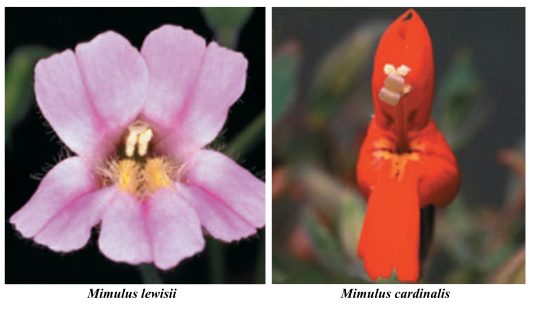
Concept explainers
To review:
The morphological differences between flower corollas of two closely related species of Mimulus, as evident from their picture. Also, give a reason as to why these differences exist on the basis of their respective pollinators.
Given:
The figure given below shows the two species of monkeyflower (Mimulus).

Introduction:
Flowers from the same species can have a variety of morphological differences on the basis of their color, structure, and texture. Pollination plays an important role in the life cycle of plant as it facilitates asexual reproduction of plants. The color of a flower depends on the type of pollination occurred in its parent plant. Pollination is carried with the help of different agents like insects, birds, wind, water, and animals.
Want to see the full answer?
Check out a sample textbook solution
Chapter 28 Solutions
LIFE:SCIENCE OF BIOL.(LL) >CUSTOM<
- Follow the key on page 1 to direct the steps, alongside with it's illustration of key on page 2, to fill out the sheets on the second page of the each of the directed 16 species' labeled name, sequence of line choice, family, pollinator(s), and why this pollinator. Thank you.arrow_forwardSelf-fertilization, or selfing, seems to have obvious disadvantages as a reproductive “strategy” in nature, and ithas even been called an “evolutionary dead end.” So it issurprising that about 20% of angiosperm species primarily rely on selfing. Suggest a reason why selfing might beadvantageous and yet still be an evolutionary dead end.arrow_forwardBoth wind and water pollinated flowers are not very colourful and do not produce nectar. What would be the reason for this?arrow_forward
- What is the differencebetween self pollination andcross pollination? Which ofthese two modes ofpollination contributes moreto the plant diversity?arrow_forwardRound seed is dominant over wrinkled. Yellow cotyledon is dominant overgreen. Full pod is dominant over constricted. The genes for these traits arefound on separate chromosomes. If a trihybrid plant is self-fertilized, what isthe chance of an offspring having wrinkled seed with yellow cotyledons in fullpods?Express answer in fraction form.arrow_forwardWhat are the variations in floral structure in this cross floral diagram? Note that in epigynous flowers, the ovary is represented by a heavier line than in hypogynous and perigynous flowers.arrow_forward
- What type of stem modification does -Phoenix sylvestris-Cassia obtusifolia-Bauhinia anguina have?arrow_forwardIn the Kotukutuku plant, Fuchsia excortiata, why do pollinated flowers remain attached to the plant for several days after pollination occurs and nectar is no longer produced Size of flower and pollination Annual versus perennial reproduction Time and expense to grow the pollen tube outweighs the cost of maintaining the flower on the tree Size of flower and number of flowers on inflorescencearrow_forwardWhat kind of flowers does -Phoenix sylvestris-Cassia obtusifolia-Bauhinia anguina-Pistia stratiotes-Calotropis gigantea-Gloriosa superba-Ficus benghalensis have?arrow_forward
- Plants reproduce through various methods. Explain which method helps to create genetic variability in crop plants? Moreover elaborate mechanisms promoting self or cross pollination.arrow_forwardWhat are chasmogamous flowers? Can cross-pollination occur in cleistogamous flowers? Give reasons for your answer.arrow_forwardHow do the petals of wind-pollinated flowers differ from the petals of most insect-pollinated flowers? How is this difference adapative?arrow_forward
 Human Anatomy & Physiology (11th Edition)BiologyISBN:9780134580999Author:Elaine N. Marieb, Katja N. HoehnPublisher:PEARSON
Human Anatomy & Physiology (11th Edition)BiologyISBN:9780134580999Author:Elaine N. Marieb, Katja N. HoehnPublisher:PEARSON Biology 2eBiologyISBN:9781947172517Author:Matthew Douglas, Jung Choi, Mary Ann ClarkPublisher:OpenStax
Biology 2eBiologyISBN:9781947172517Author:Matthew Douglas, Jung Choi, Mary Ann ClarkPublisher:OpenStax Anatomy & PhysiologyBiologyISBN:9781259398629Author:McKinley, Michael P., O'loughlin, Valerie Dean, Bidle, Theresa StouterPublisher:Mcgraw Hill Education,
Anatomy & PhysiologyBiologyISBN:9781259398629Author:McKinley, Michael P., O'loughlin, Valerie Dean, Bidle, Theresa StouterPublisher:Mcgraw Hill Education, Molecular Biology of the Cell (Sixth Edition)BiologyISBN:9780815344322Author:Bruce Alberts, Alexander D. Johnson, Julian Lewis, David Morgan, Martin Raff, Keith Roberts, Peter WalterPublisher:W. W. Norton & Company
Molecular Biology of the Cell (Sixth Edition)BiologyISBN:9780815344322Author:Bruce Alberts, Alexander D. Johnson, Julian Lewis, David Morgan, Martin Raff, Keith Roberts, Peter WalterPublisher:W. W. Norton & Company Laboratory Manual For Human Anatomy & PhysiologyBiologyISBN:9781260159363Author:Martin, Terry R., Prentice-craver, CynthiaPublisher:McGraw-Hill Publishing Co.
Laboratory Manual For Human Anatomy & PhysiologyBiologyISBN:9781260159363Author:Martin, Terry R., Prentice-craver, CynthiaPublisher:McGraw-Hill Publishing Co. Inquiry Into Life (16th Edition)BiologyISBN:9781260231700Author:Sylvia S. Mader, Michael WindelspechtPublisher:McGraw Hill Education
Inquiry Into Life (16th Edition)BiologyISBN:9781260231700Author:Sylvia S. Mader, Michael WindelspechtPublisher:McGraw Hill Education





